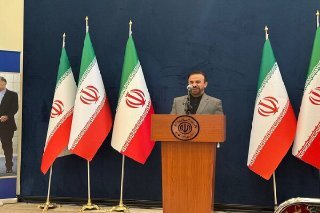TEHRAN – The late Iranian Foreign Minister Hossein Amir Abdollahian garnered global recognition as the "Minister of Resistance" due to his extensive and effective efforts in defending and supporting Gaza in international forums, Iran’s Deputy Foreign Minister for Legal and International Affairs stated on Monday.
Reza Najafi was speaking at a press conference held to commemorate the 1020 days Amir Abdollahian spent as Iran’s foreign minister. The late diplomat lost his life alongside Iranian President Ebrahim Raisi during a helicopter crash on May 19.
Najafi emphasized that Abdollahian's strategic plan for foreign policy focused on increasing international cooperation and advocating for the oppressed, particularly in Gaza and Palestine. “Iran's foreign policy, characterized by Martyr Amir Abdollahian was balanced, dynamic, and intelligent. It focused on increasing international cooperation and paid great attention to the oppressed people of Palestine.”
The diplomat commended Amir Abdollahian's unwavering commitment to representing Iran's interests in various international forums. “In international forums, the agenda often favors developed countries. However, Iran's approach has been consistent: to actively participate in these forums and ensure its voice is heard. We will be present everywhere, and there is no empty seat for Iran."
Furthermore, Najafi discussed Iran's diplomatic efforts over the past thousand days, emphasizing the country's dedication to multilateralism and effective participation in international organizations. He highlighted Iran's active role in regional mechanisms such as the Conference on Interaction and Confidence-Building Measures in Asia (CICA), which has isolated the Zionist regime from participating in meetings.
On human rights issues, Najafi reiterated Iran's advocacy for human rights and condemned Western allegations against the country as politically motivated. “The West has been exploiting human rights to fulfill its political goals,” he noted adding that despite hostile acts by Washington and Europe, Iran is ready to engage in dialogue to resolve issues.
Regarding the assassination case of Iran’s top anti-terror commander General Qassem Soleimani, Najafi mentioned a dedicated committee overseeing international legal mechanisms to hold those responsible for the crime accountable. He also addressed the release of Iran's blocked assets in various countries, stating that Iran's assets have been unfrozen, but obstacles remain due to unilateral sanctions.
In anticipation of the upcoming inauguration ceremony for the new government, the diplomat confirmed invitations sent to leaders from other countries and expressed optimism for a successful and impactful event. He underscored the importance of international participation in the ceremony and highlighted preparations for a positive international outcome.
‘Economic diplomacy contributes to political and security stability’
Also speaking at the press conference, Mehdi Safari, Deputy Foreign Minister for Coordination on Economic Diplomacy, highlighted the significant impact of economic issues on political and security matters. Safari emphasized that economic activities played a crucial role in calming tensions with neighboring countries, stating, "Economic achievements have positive effects on political and security issues."
Discussing transportation corridors, Safari mentioned the progress in Chabahar port operations and the potential for increased trade through various routes. He underscored the significance of transit agreements in boosting foreign exchange earnings.
Safari also discussed Iran's efforts in technology transfer and knowledge-based initiatives, aiming to reach a target of $5 billion in revenue. He highlighted collaborations with other countries to equip hospitals with Iranian technology.
On the topic of multilateral actions, Safari elaborated on Iran's membership in BRICS and its pursuit of joining the Shanghai Cooperation Organization. He emphasized the benefits of such memberships in facilitating bilateral meetings and enhancing foreign trade opportunities.
Regarding Iran's recent economic trip to Saudi Arabia, Safari expressed optimism about future collaborations with the private sector. “There are plans for a joint commission with Saudi Arabia to showcase Iranian technologies,” he said.
During the session, Alireza Bigdeli, the Deputy Foreign Minister for Consular, Parliamentary, and Iranian expatriates Affairs, highlighted the efforts and achievements of the consular sector in serving Iranian citizens abroad.
Bigdeli emphasized that all activities in the consular sector are aimed at meeting the needs of Iranian citizens abroad. “The Ministry of Foreign Affairs has 140 representations in 103 countries, which play a crucial role in economic diplomacy and political relations,” he declared.
The official provided statistics on consular services in the past three years, including the issuance and renewal of 200,000 Iranian passports abroad, as well as the issuance of 1,660,000 visas for foreign nationals to travel to Iran. Additionally, he highlighted the Ministry's efforts in facilitating the pilgrimage to Imam Reza's shrine and its active engagement in sports and tourism diplomacy.
Regarding Iranian prisoners abroad, Bigdeli mentioned that the Ministry is actively engaged in seeking the release of detained Iranian nationals in various countries. He specifically addressed the situation of Iranian prisoners in Saudi Arabia and expressed hope for their imminent release. “We have one pilgrim imprisoned in Saudi Arabia, and one person detained due to his activities on social media. We sent five notes and our consular deputy negotiated with the Saudi ambassador on their behalf. We hope they will be released soon.”


No comments:
Post a Comment